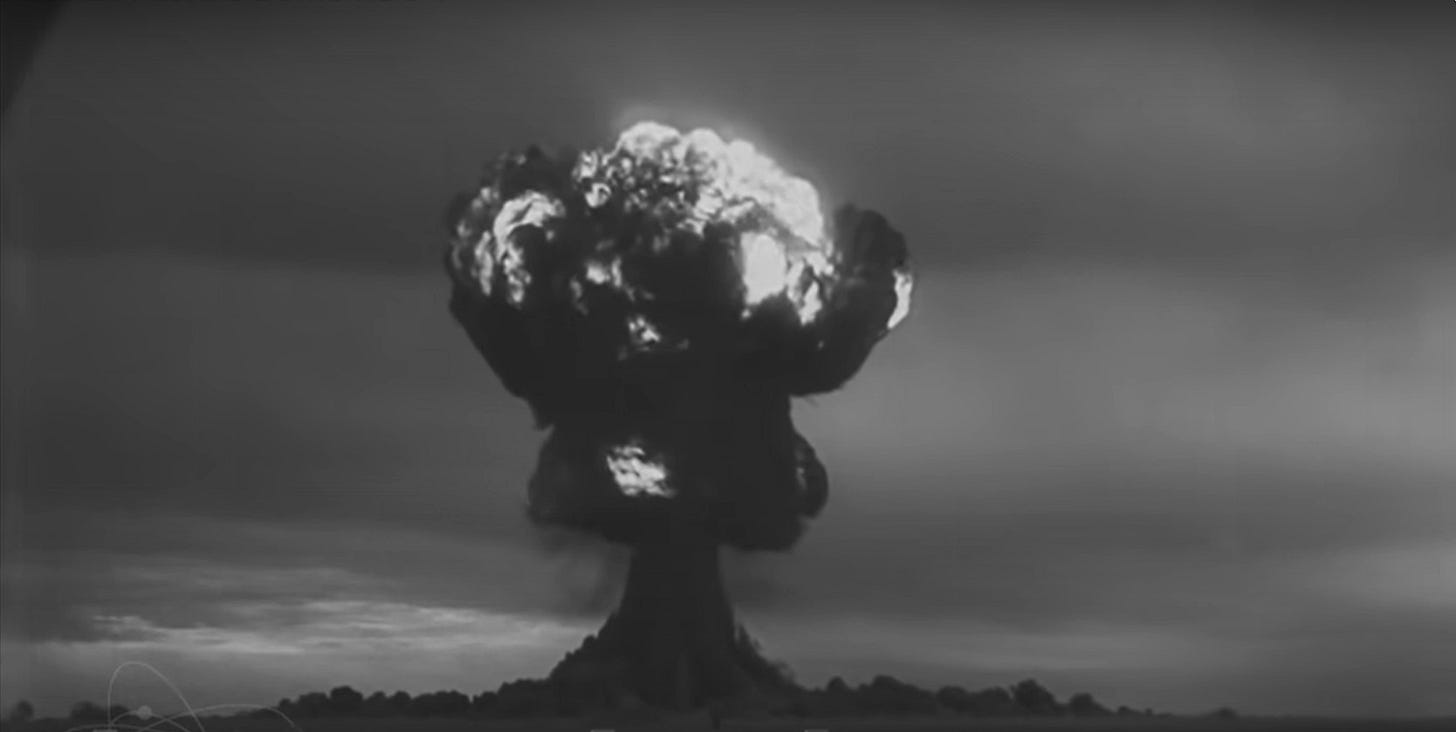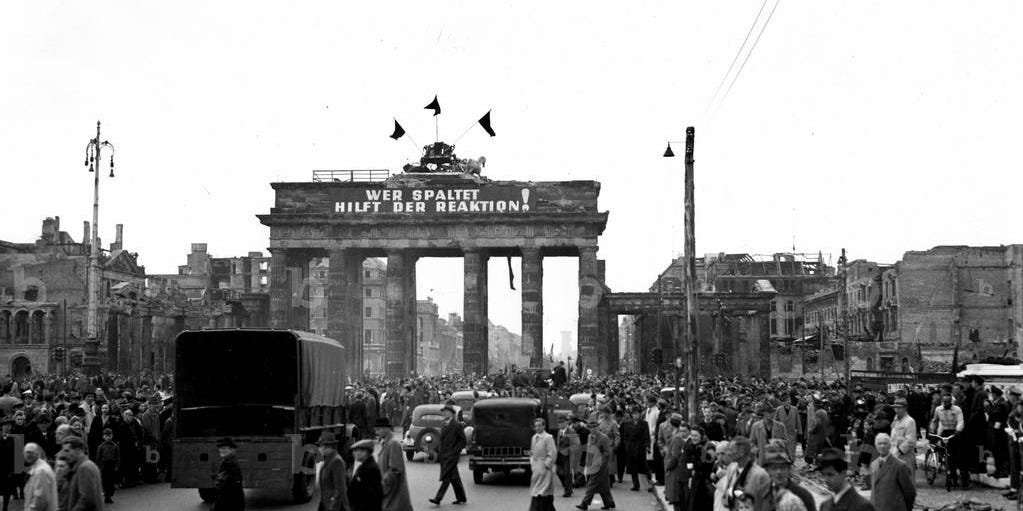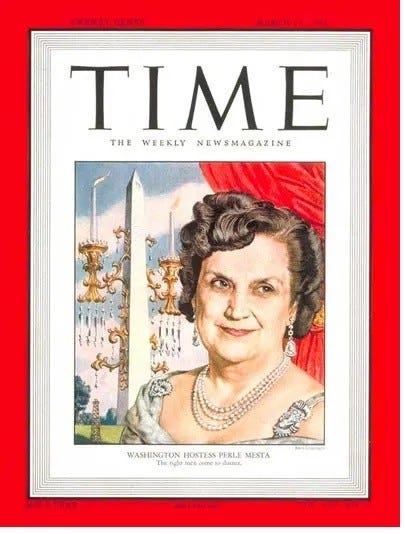The Black Russian - The nuclear cocktail
The Russian Bear rears its head.
Perle stepped from the car, avoiding the puddles, and ducking under the red awning as rain pelted down. The doorman opened the door, and she entered the sumptuous reception.
The pristine white Arctic fox fur cape, a gift from her late husband, fell in voluminous folds down her shoulders. It draped elegantly over the navy blue suit she had purchased for her new diplomatic post.
The navy pillbox hat, with a matching veil over her brow, added an air of mystery to her carefully coiffed appearance as her shoes clicked authoritatively on the marble floor.
The large stained-glass windows behind tall marble columns were illuminated by the soft glow of elegant chandeliers.
The grandeur of the hotel's reception area, with its ornate woodwork and richly decorated ceiling, welcomed guests as a flickering fireplace cast a warm glow over the plush leather chairs.
Perle's gaze swept across the lobby, where the front desk, bathed in chandelier lighting, was staffed by smartly suited attendants welcoming guests.
She glanced at her watch, the ticking seconds highlighting two hours left until Harry's announcement. Each passing minute felt like an eternity, the knot in her stomach tightened, knowing the delicate web of diplomatic relations she had painstakingly woven might soon unravel.
She intended to fortify herself with a drink, bracing for the diplomatic challenges Harry's announcement would bring.
As Perle made her way purposefully through the lobby to the bar, she reflected on her upcoming meeting with Robert Daniel Murphy. Over countless strategy sessions and advice over coffee, he as the US ambassador to Belgium was her guiding light in the intricate dance of diplomacy, after her sudden ascent to Ambassador to Luxembourg.
A luminous string of pearls adorned her neck, contrasting with the dark fabric of her suit. The luxurious woolen skirt, falling just below her knee, swayed with each of her determined steps as she entered the bar.
"Shall we?" Perle's voice wavered, her gaze locking onto Murphy's with a hint of trepidation. He caught the look in her eyes and gave a reassuring nod. "After you, my dear." The familiar chairs embraced them like old friends as they settled in.
Gustave approached, his familiar smile a welcoming sight. Perle mustered a smile in return, but it faltered, not quite reaching her eyes as she greeted him. "One of your Black Russians, Gustave," she said, her tone betraying the weight of the day's events. "It seems a fitting choice."
Gustave's expression flickered with concern as he observed Perle's strained smile and the dimmed spark that usually lit her eyes.
Perle noticed Murphy's nod to Gustave, a familiar routine as comfortable as the aged wood of the bar they leaned against. Murphy's order was unspoken yet understood by Gustave, a silent ritual between the two men.
As they absorbed the contents of the briefing from Washington, Perle and Murphy exchanged a weighted glance. A heavy silence settled between them, the gravity of global politics seeming to press down on their shoulders.
Clearing his throat, Murphy deftly changed the subject. 'How was the party?' he asked.
A satisfied smile played across Perle's lips as she recounted the successful soirée. 'The right conversations sparked at just the right time.’ Konrad Adenauer and the German delegation had celebrated his election, the formation of the Federal Republic of Germany, and the lifting of the Soviet blockade on West Berlin the month before. The party had been boisterous.
Gustave returned with a tray of drinks, the clinking of glasses punctuating the tense silence that had settled over the pair. He placed a tumbler of Irish whiskey before the gentleman and slid the enigmatic Black Russian across the polished surface of the bar towards Perle, its dark depths mirroring the uncertainty clouding her thoughts.
'Gustave, would you mind turning on the BBC?' Murphy’s tone implied it was more than a casual request. 'Not at all, sir,' the bartender replied with an accommodating nod, his expression turning thoughtful.
Perle heard the radio crackle to life, a faint hiss of static preceding Ella Fitzgerald's rich voice drifting over the airwaves.
Murphy swirled the ice in his glass, eyeing Perle's drink with curiosity. “Opting for a Black Russian? A nod to your diplomatic dance?" His tone was lightly teasing. She smiled, a touch ruefully. "Maybe it's just my way of staying focused.”
In a few moments, the news began. Perle's head snapped up, her pulse quickening as the newscaster's grave tone seized the entirety of the bar's attention, and a hushed silence descended.
The newscaster's words cut through the haze of cigarette smoke and idle chatter surrounding Perle, their stark and sobering message hitting her like a physical blow. 'President Truman has confirmed - the Soviet Union has developed nuclear capability.'
The station continued with Harry himself reading a carefully worded, low-key statement. “We have evidence,” he said, “within recent weeks an atomic explosion occurred in the USSR.”
This changed everything. Just months ago, briefings had assured her that the United States maintained a comfortable three to four-year lead in the nuclear arms race. Harry's statement attempted to downplay the gravity of the development.
“The eventual development of this new force by other nations was to be expected. This probability has always been taken into account by us.”
Perle's mind raced, the implications of the announcement rippling outward like a pebble tossed into a still pond. The reality of a nuclear-armed adversary transformed the diplomatic landscape overnight, the Soviet Union's newfound nuclear capability akin to a new piece on the chessboard, primed for a decisive gambit.
A bead of perspiration appeared on Perle's temple as the new nuclear reality settled upon her. Her fingers toyed with the string of pearls at her neck, the smooth beads offering little solace as scenarios played out in her mind. Now, as an intermediary, Perle understood that every move, every word, would carry unprecedented weight in the fragile balance of power.
She gripped her glass tighter, her thoughts swirling as darkly as the drink it contained. With the new nuclear reality, navigating the drastically shifting landscape of international diplomacy would be an immense challenge. Perle sensed she might need more than just one Black Russian to fortify herself.
The Black Russian was invented in 1949 at the Hotel Metropole in Brussels. It was created by Gustave Tops, the bartender there, as a signature drink for Perle Mesta, the US ambassador to nearby Luxembourg. Mesta was a sensation. She had been appointed just a few months previously but had already endeared herself to the people of Luxembourg and nearby Belgium. Her way with people made her a hit with regular Luxembourgers.
Perle was born with a silver spoon in her mouth. Her father struck it big in the Oklahoma oil rush and even bought a fancy hotel for the family to live in.
Perle grew up for many years in this hotel, where her family entertained the elite of the Oklahoma political set. When she was 28, she married George Mesta, a Pennsylvania steel magnate.
Perle took a keen interest in the quality of life of the workers at her husband’s plant, creating programs to help them with education and childcare.
Sadly, Perle's husband George passed away from a heart attack in 1925, leaving her a wealthy widow after just 8 years of marriage.
She settled in Newport, Rhode Island. At her home 'Midclyffe', she started to throw parties, as people are inclined to do in Newport, for the right people. When Pearl moved to Washington, D.C., in 1940, she leased the previous home of Herbert Hoover.
Mesta dedicated herself to women's rights, becoming an active member of the National Woman's Party and an early supporter of the Equal Rights Amendment. Her deep involvement in politics was further reflected in her longstanding support for Harry Truman.
Her fame for hosting lavish parties in Washington DC, often attended by Harry and Bess Truman, earned her the nickname 'Hostess with the mostess.’ These hooleys were bipartisan affairs. Eisenhower once sang at one of her parties and President Truman played the piano at another. Perle Mesta's philosophy for successful entertaining, 'a warm hostess, cool music, hot food, and cool guests,' defined her legendary gatherings.
In 1949, despite having no formal diplomatic experience, Truman appointed her as US Ambassador to Luxembourg, a decision that sparked criticism yet underscored her formidable influence in Washington politics. She appeared on the March 14, 1949, cover of Time.
While controversial, with allegations that it was a reward for her financial contributions, Mesta's appointment as ambassador marked a significant step for women in politics, challenging the norms of the time. She even drew praise from that elder stateswoman, Eleanor Roosevelt.
Mesta persevered through ridicule in the press. Her resilience and achievements underscored the dismissive attitudes that women in power often had to combat. She went to Luxembourg burdened with responsibility, and faced fierce hostility from career diplomats who looked down on her appointment. Official Luxembourg was ambivalent - they struggled to take her seriously, yet enjoyed the attention and elevated international status her ambassadorship provided.
Perle inspired the lead character Sally Adams in Irving Berlin's Call Me Madam (which opened on Broadway in 1950). While back in the US, she invited Bess and Margaret Truman to New York to see the show. This was despite several unflattering references to herself and the Trumans.
She was proud to have assisted in the creation of the European Coal and Steel Community, the precursor to today’s European Union. One of her personal projects was the planning of monthly G.I. parties to entertain the U.S. troops stationed nearby. By the time she left in 1953, she had personally paid to entertain a total of 25,000 men and women in military service in Europe.
In the 1960s, Mesta switched back to the Republican Party, becoming a staunch supporter of President Eisenhower. The two were neighbors in Newport, and Eisenhower was the husband of Mesta's close friend, Mamie.
In the last twenty years of her life, Mesta never gave up the goal of a constitutional amendment granting equal rights to women. At the 1952 Democratic Convention, Mesta made a powerful statement in support of women's rights: "Together, men and women are a tremendous force. And I feel certain that when our forefathers said our society should be based on equal rights for all men, they meant equal rights for all men and women.”
In 1960, Mesta published her memoir, 'Perle: My Story,' which offered insights into her philosophy on hosting parties. Parties were more than just fun for Mesta. They were a way for people to talk and understand each other. At her parties, there were people from different political, economic, and religious groups. Mesta created an atmosphere where people listened instead of lecturing. Her parties let people have real conversations. They helped connect people who thought differently. Mesta used parties to bring people together who didn't always agree.
Mesta passed away in 1974 and was laid to rest alongside her husband in Pennsylvania.
In the mid-1960s, someone added milk or cream to the Black Russian, creating the White Russian variation. The drink later gained further popularity when The Dude, played by Jeff Bridges in the cult classic The Big Lebowski, was depicted knocking back eight of them.
Renowned for its simplicity and rich flavor profile, the Black Russian is a cocktail that combines vodka and coffee liqueur. Here's a straightforward recipe to make one:
Ingredients:
2 oz (60 ml) Vodka
1 oz (30 ml) Coffee Liqueur (such as Kahlúa or, Galliano Espresso Coffee Liqueur)
Instructions:
Fill a Mixing Glass: Add ice cubes to a mixing glass to cool the liquid as you mix it, ensuring your cocktail is well-chilled.
Combine Ingredients: Pour 2 ounces of vodka and 1 ounce of coffee liqueur over the ice in the mixing glass.
Stir: Use a long spoon to stir the mixture gently but thoroughly, for about 30 seconds to a minute, allowing the ingredients to blend while maintaining the cocktail's richness without diluting it too much.
Strain and Serve: Strain the cocktail into an old-fashioned glass filled with fresh ice. For a classic presentation, the Black Russian is typically served over ice cubes, but you can also serve it neat if preferred.
Garnish (Optional): While not traditionally garnished, you can add a twist by garnishing with a cherry or an orange twist for a hint of fruitiness, or simply enjoy it as is to savor the deep, inviting flavors of coffee and vodka.
Tips:
Quality Ingredients: Use a good quality vodka and coffee liqueur, as the simplicity of this drink means the flavors of these two ingredients are front and center.
Adjust to Taste: Feel free to adjust the ratio of vodka to coffee liqueur according to your taste. Some prefer a stronger coffee flavor, while others might like a more pronounced vodka presence.
Serving Suggestions: The Black Russian can be served as a pre-dinner cocktail or as a digestif after a meal, offering versatility and enjoyment for various occasions.





Thoroughly enjoyed this one as well. Took me back to my years in the West Indies when this drink was quite the rage then. Loved the 'elegance' of this woman Perle, the drink seems to suit, strong but tamed by the warm & sweet.
These stories could definitely be made into a book of short stories. Maybe it could be called something like, 'Cocktail Hour: the origin stories of Americas favorite drinks'. I love books that incorporate recipes :)